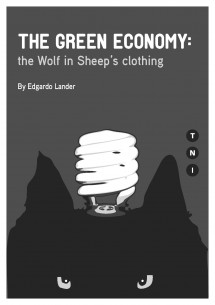The Green Economy: the Wolf in Sheep’s clothing
The fundamental flaw at the heart of UNEP's report "Towards a Green Economy" is its failure to analyse the extraordinarily unequal power relations that exist in today’s world, and the interests at play in the operation of this global economic system.

Authors
In all its hundreds of pages, the UNEP report "Towards a Green Economy" (2011) presents many possibilities for altering patterns of production, industry, agriculture, the organisation of cities, construction systems, transport. It also brings together a wide range of rich experiences in alternative technology, renewable energy and new regulatory regimes that exist in different parts of the world. This shows that there are many processes around the world today seeking alternatives to the destructive logic of the hegemonic models of production and consumption. This should be recognised as an important contribution made by the report to debates on alternatives.
Nevertheless, the gaps in the report are much more notable.
Corresponding to the superficial approach that characterises most documents of this kind, this report completely ignores all the most controversial issues, creating a fictional world that does not operate responding to powerful interests, but on the idea of political leaders building consensus for the benefit of all.
An example of the issues not touched upon is the case of war and the military industrial complex, one of the most devastating dynamics, in human and environmental terms, existing in the world today. Given the massive amounts of material and energy it consumes for the manufacture and transport of military equipment, and through the impact, and long-term consequences, of their use in military conflicts, it must be considered a central dimension of the reigning logic of destruction. Yet this issue is apparently taboo, and cannot be mentioned in international bodies without offending the United States.
Even more fundamental is the complete absence of any consideration of the significance of the extraordinarily unequal power relations that exist in today’s world, and the interests that are at play in the operation of this global system. The report repeatedly refers to policies, but never to politics, never to power. In political terms, the authors declare themselves to be neutral, and state that the “green economy does not favour one or other political currents, as it is applies to all economies, be they controlled by the State or by the market” (UNEP, p. 5). The authors of this report appear to live in a fantasy world in which governments are democratic and make their decisions based on the will of the majority and the welfare needs of current and future generations. They seem to believe (or they would have us believe) that the existing political regimes and the so-called “policy formulators”, are able to impose norms of behaviour on the corporations and the financial markets. They seem to assume that finance capital and the transnational corporations that are operating as active agents of the accelerated devastation of the planet, do so not because that is how they seek to maximise their profit margins in the short term, but because they do not have enough information, or because the signals they receive from the regulatory frameworks within which they operate are not clear enough.
These authors opt to ignore the fact that the capacity of existing political systems to establish regulations and restrictions to the free operation of the markets – even when a large majority of the population call for them – is seriously limited by the political and financial power of the corporations. This is particularly evident in the United States. No environmental regulatory policy and no international commitment can be assumed by the government of that country if it does not have the prior approval of the major corporations potentially affected by the measures. In fact, these corporations have the capacity to veto the policies with which they do not agree. They demonstrate this powerfully in the way the United States has been prevented from making any commitment to reduce greenhouse gas emissions in the United Nations climate change negotiations, and in the way they have prevented the passing of even the most timid environmental regulations that have been proposed in recent years. For governments, the political cost of affecting corporate interests is simply too high.
The structural adjustment programmes with which European governments have responded to the current crisis, that have even included constitutional reform in Spain, are being implemented to respond to the ever more precise demands coming from “the markets”. This is leading to new steps to undermine any notion of democracy and towards growing levels of concentration of both wealth and power in decision-making on a global scale.
In these conditions, the list of recommendations and political proposals that the UNEP calls on the governments of the world to negotiate and implement is nothing more than the naïve expression of very good intentions, without any possibility of altering the current course of the planet. No proposal based on completely ignoring contemporary geopolitical realities has any hope of making a significant contribution to the global struggles we face today.
The resistance movements in struggle around the world today are all too aware of this fact. It is therefore very unlikely that they will be fooled by the false promises of the green economy.
Pages: 10
